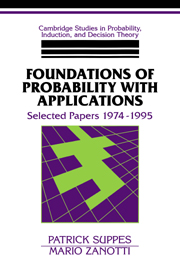13 - Mastery learning of elementary mathematics: Theory and data
Published online by Cambridge University Press: 05 June 2012
Summary
INTRODUCTION
In this final paper, which is the only one in this volume that has not been previously published, we develop in some detail a portion of the extensive work we have done together over nearly twenty years on the application of probabilistic models and methods to problems of curriculum and learning in a computer-based setting. It might seem that there is little connection between this work and what has been described in earlier parts of this volume. In our own mind, however, there is an intimate connection and considerable continuity. The general reason is easy to state. Although much of our work has been motivated by Bayesian considerations and the admiration we have for the pioneering work of Bruno de Finetti in developing concepts of subjective probability, we also recognize how complicated real applications of Bayesian ideas are. Even more generally, we recognize how complicated real applications of normative ideas are. The normative considerations that guide the work described here concern how to optimize the course of learning for each individual student. We pick as our example elementary mathematics, partly because there has been such a long history of research on the learning of elementary mathematics, especially arithmetic, throughout this century, beginning at least with the early work of Edward Thorndike, if not even earlier.
As one reflects on the problem of organizing a curriculum for optimizing individual learning, it is clear that general Bayesian considerations play only a small part.
Information
- Type
- Chapter
- Information
- Foundations of Probability with ApplicationsSelected Papers 1974–1995, pp. 149 - 188Publisher: Cambridge University PressPrint publication year: 1996
Accessibility standard: Unknown
Why this information is here
This section outlines the accessibility features of this content - including support for screen readers, full keyboard navigation and high-contrast display options. This may not be relevant for you.Accessibility Information
- 2
- Cited by
